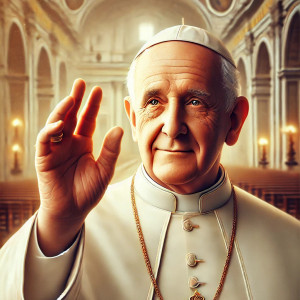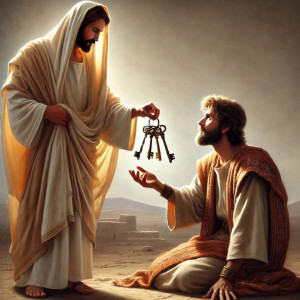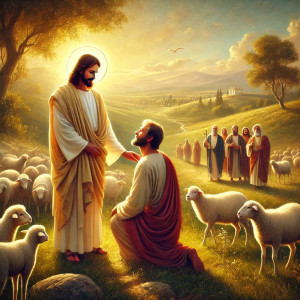A vicar is someone who acts on behalf of another with delegated authority. In the Catholic Church, the Pope is called the Vicar of Christ because he acts as Christ's representative on Earth. This designation reflects the authority Christ granted to Peter and his successors, enabling the Pope, as Peter's successor, to guide the Church under the Holy Spirit's direction.
Catholics firmly believe that the Pope is the Vicar of Christ, meaning he does not replace Christ but acts on His behalf in guiding the Church. This doctrine is deeply rooted in Scripture and Tradition. The Catechism of the Catholic Church, in paragraph 882, states that the Pope, as Peter's successor, is the "perpetual and visible principle and foundation of unity both of the bishops and of the faithful." Therefore, he holds unique and supreme authority over the entire Church.
The role of the Vicar of Christ is to lead God's people in matters of faith and morals, maintain the Church's unity, and safeguard apostolic doctrine. He is the supreme pastor who ensures that the Christian faith is lived and transmitted according to Jesus' teachings. This authority, exercised by the Pope, is not merely administrative but spiritual, reflecting Christ's mission to shepherd the flock.
The biblical basis for this view is clear. In Matthew 16:18-19, Jesus says to Peter: "You are Peter, and on this rock, I will build my Church [...] I will give you the keys of the kingdom of heaven." This passage highlights Peter's unique role in leading the Church. By giving Peter the "keys of the kingdom," Jesus grants him special authority, which the Church believes is passed on to his successors, the Popes.
Moreover, in John 21:15-17, Jesus instructs Peter to feed His sheep, reinforcing his pastoral leadership. Acts 15:7 also shows Peter taking the lead at the Council of Jerusalem, exercising the authority to define doctrinal directions for the Church.
Thus, Catholics view the Pope as the Vicar of Christ, based on the authority Christ gave to Peter, which continues through his successors as the Church's chief pastor until Jesus' glorious return.

What Does Vicar of Christ Mean?
The title "Vicar of Christ" indicates that the Pope acts on behalf of Christ on Earth. He does not replace Christ but serves as His representative, guiding the Church with the authority delegated by Jesus to Peter and his successors (CIC §882).

Biblical Foundations of Papal Authority
In Matthew 16:18-19, Jesus gives Peter the "keys of the kingdom," signifying his unique leadership role in the Church. John 21:15-17 reinforces this mission, where Jesus instructs Peter to "feed His sheep," an authority passed to the Popes.

The Mission of the Vicar of Christ
As the Vicar of Christ, the Pope is the supreme pastor of the Church, tasked with guiding in faith and morals, maintaining unity, and protecting apostolic doctrine. His leadership is spiritual, reflecting Christ's mission to shepherd the flock until His return.
-
CIC 880 - 887
-
Matthew 16:18-19
-
John 21:15-17
-
Matthew 16:18-19: "You are Peter..." – Jesus grants Peter unique authority, symbolized by the "keys of the kingdom," which the Church believes is passed on to the Popes.
-
Luke 22:31-32: "Strengthen your brothers..." – Jesus assigns Peter the mission to confirm the other Apostles, representing his leadership role.
-
John 21:15-17: "Feed my sheep..." – Jesus entrusts Peter with leadership over the flock, identifying him as the Church's chief pastor.
-
Acts 1:15: "Peter stood up among the brothers..." – After Christ's ascension, Peter assumes leadership, guiding the early Church.
-
Acts 2:14: "Peter, standing up..." – At Pentecost, Peter is the first to speak on behalf of the Apostles, reaffirming his primacy.
-
Acts 15:7: "Peter rose up..." – At the Council of Jerusalem, Peter speaks first and defines the Church's decision, exercising leadership authority.
-
Matthew 10:2: "Simon, called Peter, comes first..." – Peter is always named first among the Apostles, indicating his preeminence.
-
1 Peter 5:1-2: "I exhort the elders... Shepherd the flock..." – Peter exhorts the Church's leaders, reaffirming his supreme pastoral role.
-
John 1:42: "You shall be called Cephas..." – Jesus gives Peter a new name, symbolizing his new mission and authority.
-
Matthew 18:18: "Whatever you bind on earth..." – Peter, along with the Apostles, receives the power to bind and loose, demonstrating the authority given to Church leadership.
While every effort is made to ensure accuracy and conformity with the teachings of the Catholic Church, we acknowledge that errors in interpretation or presentation may occur. If you identify any answer or content that is not in line with the official teachings of the Church, we kindly ask you to inform us. We are committed to reviewing and promptly correcting any errors that are identified.
We understand that fidelity to the Church’s doctrine is fundamental, and for this reason, we value users' collaboration in maintaining the integrity of the content presented.
We thank you for your understanding and commitment to the Catholic faith.







